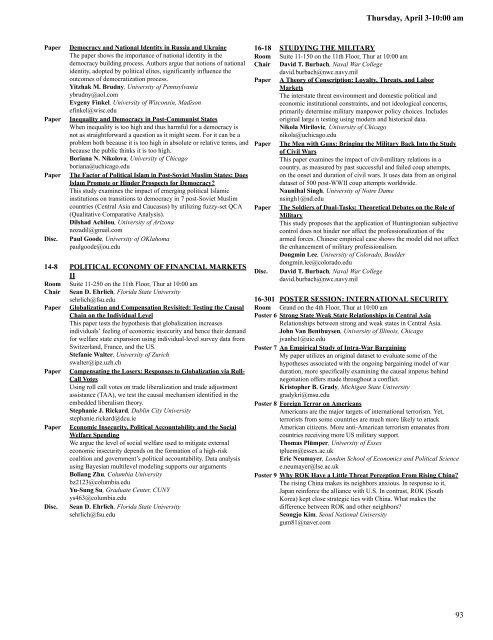2008 Conference Program - Midwest Political Science Association
2008 Conference Program - Midwest Political Science Association
2008 Conference Program - Midwest Political Science Association
Create successful ePaper yourself
Turn your PDF publications into a flip-book with our unique Google optimized e-Paper software.
Thursday, April 3-10:00 am<br />
Paper<br />
Paper<br />
Paper<br />
Disc.<br />
Democracy and National Identity in Russia and Ukraine<br />
The paper shows the importance of national identity in the<br />
democracy building process. Authors argue that notions of national<br />
identity, adopted by political elites, significantly influence the<br />
outcomes of democratization process.<br />
Yitzhak M. Brudny, University of Pennsylvania<br />
ybrudny@aol.com<br />
Evgeny Finkel, University of Wisconsin, Madison<br />
efinkel@wisc.edu<br />
Inequality and Democracy in Post-Communist States<br />
When inequality is too high and thus harmful for a democracy is<br />
not as straightforward a question as it might seem. For it can be a<br />
problem both because it is too high in absolute or relative terms, and<br />
because the public thinks it is too high.<br />
Boriana N. Nikolova, University of Chicago<br />
boriana@uchicago.edu<br />
The Factor of <strong>Political</strong> Islam in Post-Soviet Muslim States: Does<br />
Islam Promote or Hinder Prospects for Democracy<br />
This study examines the impact of emerging political Islamic<br />
institutions on transitions to democracy in 7 post-Soviet Muslim<br />
countries (Central Asia and Caucasus) by utilizing fuzzy-set QCA<br />
(Qualitative Comparative Analysis).<br />
Dilshad Achilou, University of Arizona<br />
nozadil@gmail.com<br />
Paul Goode, University of OKlahoma<br />
paulgoode@ou.edu<br />
14-8 POLITICAL ECONOMY OF FINANCIAL MARKETS<br />
II<br />
Room Suite 11-250 on the 11th Floor, Thur at 10:00 am<br />
Chair Sean D. Ehrlich, Florida State University<br />
sehrlich@fsu.edu<br />
Paper Globalization and Compensation Revisited: Testing the Causal<br />
Chain on the Individual Level<br />
This paper tests the hypothesis that globalization increases<br />
individuals’ feeling of economic insecurity and hence their demand<br />
for welfare state expansion using individual-level survey data from<br />
Switzerland, France, and the US.<br />
Stefanie Walter, University of Zurich<br />
swalter@ipz.uzh.ch<br />
Paper Compensating the Losers: Responses to Globalization via Roll-<br />
Call Votes<br />
Using roll call votes on trade liberalization and trade adjustment<br />
assistance (TAA), we test the causal mechanism identified in the<br />
embedded liberalism theory.<br />
Stephanie J. Rickard, Dublin City University<br />
stephanie.rickard@dcu.ie<br />
Paper Economic Insecurity, <strong>Political</strong> Accountability and the Social<br />
Welfare Spending<br />
We argue the level of social welfare used to mitigate external<br />
economic insecurity depends on the formation of a high-risk<br />
coalition and government’s political accountability. Data analysis<br />
using Bayesian multilevel modeling supports our arguments<br />
Boliang Zhu, Columbia University<br />
bz2123@columbia.edu<br />
Yu-Sung Su, Graduate Center, CUNY<br />
ys463@columbia.edu<br />
Disc. Sean D. Ehrlich, Florida State University<br />
sehrlich@fsu.edu<br />
16-18 STUDYING THE MILITARY<br />
Room Suite 11-150 on the 11th Floor, Thur at 10:00 am<br />
Chair David T. Burbach, Naval War College<br />
david.burbach@nwc.navy.mil<br />
Paper A Theory of Conscription: Loyalty, Threats, and Labor<br />
Markets<br />
The interstate threat environment and domestic political and<br />
economic institutional constraints, and not ideological concerns,<br />
primarily determine military manpower policy choices. Includes<br />
original large n testing using modern and historical data.<br />
Nikola Mirilovic, University of Chicago<br />
nikola@uchicago.edu<br />
Paper The Men with Guns: Bringing the Military Back Into the Study<br />
of Civil Wars<br />
This paper examines the impact of civil-military relations in a<br />
country, as measured by past successful and failed coup attempts,<br />
on the onset and duration of civil wars. It uses data from an original<br />
dataset of 500 post-WWII coup attempts worldwide.<br />
Naunihal Singh, University of Notre Dame<br />
nsingh1@nd.edu<br />
Paper The Soldiers of Dual-Tasks: Theoretical Debates on the Role of<br />
Military<br />
This study proposes that the application of Huntingtonian subjective<br />
control does not hinder nor affect the professionalization of the<br />
armed forces. Chinese empirical case shows the model did not affect<br />
the enhancement of military professionalism.<br />
Dongmin Lee, University of Colorado, Boulder<br />
dongmin.lee@colorado.edu<br />
Disc. David T. Burbach, Naval War College<br />
david.burbach@nwc.navy.mil<br />
16-301 POSTER SESSION: INTERNATIONAL SECURITY<br />
Room Grand on the 4th Floor, Thur at 10:00 am<br />
Poster 6 Strong State Weak State Relationships in Central Asia<br />
Relationships between strong and weak states in Central Asia.<br />
John Van Benthuysen, University of Illinois, Chicago<br />
jvanbe1@uic.edu<br />
Poster 7 An Empirical Study of Intra-War Bargaining<br />
My paper utilizes an original dataset to evaluate some of the<br />
hypotheses associated with the ongoing bargaining model of war<br />
duration, more specifically examining the causal impetus behind<br />
negotiation offers made throughout a conflict.<br />
Kristopher B. Grady, Michigan State University<br />
gradykri@msu.edu<br />
Poster 8 Foreign Terror on Americans<br />
Americans are the major targets of international terrorism. Yet,<br />
terrorists from some countries are much more likely to attack<br />
American citizens. More anti-American terrorism emanates from<br />
countries receiving more US military support.<br />
Thomas Plümper, University of Essex<br />
tpluem@essex.ac.uk<br />
Eric Neumayer, London School of Economics and <strong>Political</strong> <strong>Science</strong><br />
e.neumayer@lse.ac.uk<br />
Poster 9 Why ROK Have a Little Threat Perception From Rising China<br />
The rising China makes its neighbors anxious. In response to it,<br />
Japan reinforce the alliance with U.S. In contrast, ROK (South<br />
Korea) kept close strategic ties with China. What makes the<br />
difference between ROK and other neighbors<br />
Seongjo Kim, Seoul National University<br />
gum81@naver.com<br />
93










